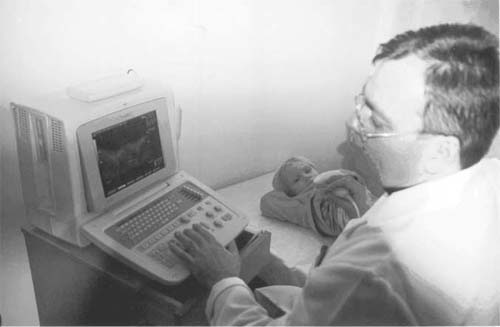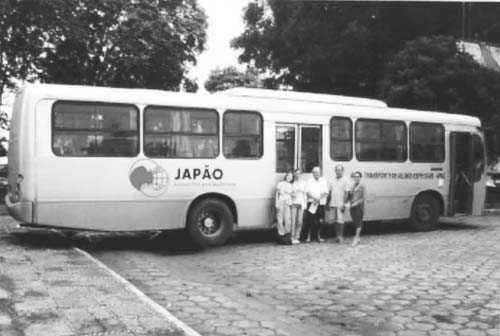Japan's Official Development Assistance White Paper 2006
Main Text > Part II ODA DISBURSEMENTS IN FISCAL YEAR 2005 > Chapter 2 Details about Japan's ODA > Section 1. Assistance Relating to the Basic Policies of the ODA Charter > 1. The Perspective of "Human Security"
1. The Perspective of "Human Security"
The expansion of globalization in recent years has increased the likelihood of cross-border threats such as terrorism, infectious diseases, environmental destruction, and transnational organized crime, as well as humanitarian crises such as sudden, severe economic disruptions and civil war. In dealing with these threats and crises, it is important not only to consider the global, regional, or national perspectives, but also to consider the perspective of "human security," which focuses on individuals.
"Human security" means "focusing on individual people and building societies in which everyone can live with dignity by protecting and empowering individuals and communities that are exposed to actual or potential threats." Japan believes that the 21st century should be a century focused on human beings. The perspective of "human security" was clearly established as an important position of diplomacy in the basic principle of the ODA Charter revised in August 2003. Later, the New Medium-Term Policy on ODA revised in February 2005 based on this revision of the ODA Charter positioned "human security" as a perspective that should underpin ODA as a whole. The perspective of "human security" can be reflected in ODA by adopting the following approaches to assistance: (1) assistance that puts people at the center of concern and that effectively reaches the people; (2) assistance to strengthen local communities; (3) assistance that emphasizes empowering of people; (4) assistance that emphasizes benefiting people who are exposed to threats; (5) assistance that respects cultural diversity, and (6) cross-sectoral assistance that mobilizes a range of professional expertise.
Japan takes a variety of measures to ensure that the perspective of "human security" is practiced at sites where assistance is actually provided. In March 1999 the Trust Fund for Human Security was established by the United Nations (UN) under the leadership of Japan. As of April 2006, Japan's contributions to this fund have totaled ¥31.5 billion, and support provided through this fund included 149 projects amounting to approximately US$204 million. By sector, there were 43 projects for poverty alleviation amounting to US$55.25 million; 38 projects for health and medical care amounting to US$31.44 million; and 18 projects for refugee assistance amounting to US$24.05 million. In terms of geographical regions, Asia was the principal recipient of assistance with 60 projects amounting to US$61.11 million, followed by Africa with 41 projects amounting to US$56.54 million, and Europe (principally Kosovo) with 13 projects amounting to US$52.48 million. In recent years, emphasis has been placed on cross-disciplinary projects jointly implemented by two or more UN organizations. Projects approved in FY2005 included a US$3.68 million project for strengthening human security through sustainable human development in the Northwestern Tanzania, implemented by UNDP, WFP, FAO, UNIDO, and UNICEF; a US$5.28 million project for Isolated and Disenfranchised Communities in the Occupied Palestine Territory, implemented by the Office of the United Nations Special Coordinator for the Middle East (UNSCO), United Nations Relief and Works Agency (UNRWA), UNICEF, UNESCO, the United Nations Development Fund for Women (UNIFEM), UNDP, WHO, and the United Nations Population Fund (UNFPA); and a US$1.71 million project to remove the tsetse fly and trypanosomosis from the Southern Rift Valley in Ethiopia and assisting agricultural development by IAEA and FAO.
Chart II-10 Disbursements to the Trust Fund for Human Security

In FY2003 the existing grant assistance for grassroots projects was expanded to create the program, the Grant Assistance for Grassroots Human Security Projects which strongly reflects the doctrine of human security. In FY2005 this grant assistance was provided to 109 countries and one region (the Palestinian territories) through 1,633 projects amounting to ¥14.4 billion. Most of the assistance was related to basic life concerns such as elementary education, basic medical care, population and AIDS countermeasures, and the public welfare environment. In terms of regions assisted, 613 projects were implemented in Latin America amounting to ¥4,872.2 million, 458 in Asia and the New Independent States (NIS) amounting to ¥3,866.86 million, 226 in the Middle East amounting to ¥3,184.15 million, and 180 in Africa amounting to ¥1,460.22 million.
In FY2005 five projects relating to the Accident at the Chernobyl Nuclear Power Plant in Ukraine were implemented to improve medical examination and treatment services for victims of the accident, including the Project for Improvement of Medical Equipment of Zhytomyr, the Project for Improvement of Medical Equipment of Zhytomyr Central City Hospital No. 2, and the Project for Support to the Community Center in Kiev for the Chernobyl Evacuated People. As these projects show, support by Japan for victims of the Chernobyl accident, which was begun after the accident occurred 20 years ago, continues to this day.

Clinical practice at a children's hospital in Zhytomyr, Ukraine
In Brazil in FY2005 school buses were provided to a school operated by the Brazilian non-profit organization Associacao de Pais e Amigos dos Excepcionais de Bastos, which supports the physically and mentally impaired and their families in Tangara da Serra City in Mato Grosso State. Almost all of these handicapped persons were students from low-income households who were driven to and from the school by means of two vehicles, a bus and a mini-wagon. These vehicles were not equipped with seat belts, lifts, or wheel chairs, and were old, having been manufactured 12 years before. For this reason, the association requested Japan to provide financial support for the purchase of a bus for the handicapped.

A school bus provided to the Parents and Friends Association to Support the Handicapped


 Next Page
Next Page